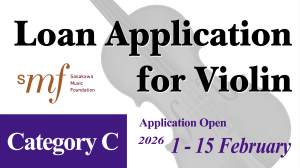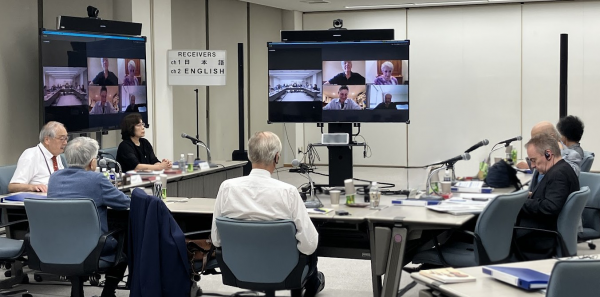Email: loan@s-mf.or.jp
9:00〜17:00(Mon-Fri)
TEL +81-(0)3-6229-5566
About Instrument Loan Project
Sasakawa Music Foundation launched the Instrument Loan Project in 1994 to make greater contributions towards the field of classical music. The Foundation has now come to own 21 instruments made by Antonio Stradivari and Bartolomeo Giuseppe Guarneri del Gesù and loans them gratis to young promising musicians and internationally active musicians regardless of their nationalities.
Application for Instrument Loan 2026
| Loan Category |
A | B | C |
|---|---|---|---|
| Instrument | Violin | Violin | Violin |
| Eligibility | 35 years old or under as of 1 September 2026 |
Must have a specific purpose of activities (e.g. Recording, Competition, Anniversary/Special/Debut Concert, etc.) |
|
| ― | Performing mainly in Japan | ||
| *Applicants can apply for both A and B at the same time | |||
| Loan Period |
2-7 years *The total possible loan period in Category A and B must be up to 7 years The loan period will be announced at the time of the result notification |
Up to 1 year The loan period will be announced at the time of the result notification |
|
| Application Period |
Sunday 1 March - Wednesday 15 April 2026 *Closes at 12:00 a.m. on 15 April 2026 (JST) |
Sunday 1 February - Sunday 15 February 2026 *Closes at 12:00 a.m. on 15 February 2026 (JST) |
|
| Evaluation |
Evaluation Determined based on the selection at the Instrument Loan Committee Meeting Separately evaluated |
Separately evaluated | |
| Result | In late August |
To be notified about 1 month prior to the requested start date of the loan *Requires about 1 month for examination |
|
| Note | Re-applying for Category A, B, or C is possible during the loan in Category A or B | Re-applying for Category C is possible after 2 years from the end date of the loan for those whose loan in Category A, B, or C has terminated | |
 Loan Application for Category C
Loan Application for Category C Instrument:Violin
Eligibility:Must have a specific purpose of activities
(Recording, Competition, Anniversary Concert,
Special Concert, Debut Concert etc.)
Loan Period:Up to 1 year
(To be announced in the result notification)
Application Period:1 February - 15 February 2026
*Closes at 23:59 on 15 February 2026 (JST)
Other
Queen Elisabeth International Music Competition
Since 1997, Sasakawa Music Foundation has loaned the Stradivarius 1708 Violin "Huggins" to the Grand Prize winners of the Queen Elisabeth International Music Competition of Belgium held in Brussels.
Conditions and Notes for Instrument Loan Application
- 1.
- The instrument player is required to sign the Loan Agreement
 with the Sasakawa Music Foundation.
with the Sasakawa Music Foundation.
If the instrument player is under 20 years of age, the legal guardian is required to sign the Loan Agreement (under 20) together with the instrument player.
together with the instrument player.
Loan Agreement
- 2.
- The loan instrument shall be designated by the Foundation.
- 3.
- The collection and return of the loaned instrument must, in principle, take place at the Sasakawa Music Foundation office in Tokyo, and must be carried out by the instrument player in person.
If the instrument player is under 20 years of age, both the instrument player and the legal guardian must be present.
All related expenses such as travel and accommodation shall be borne by the instrument player.
- 4.
- The loaned instrument must undergo a condition check every three months at one of the Foundation's designated workshops (a total of eight locations in Japan, Europe, and the United States).
All related expenses such as travel and accommodation shall be borne by the instrument player.
- 5.
- The instrument player must handle the instrument appropriately in accordance with the Foundation's instructions. Guideline

ATA Carnet
- 1.
- When taking the loaned instrument outside of Japan, the instrument player must complete customs procedures using the ATA Carnet*.
The instrument must be brought back to Japan within the one-year validity period of the ATA Carnet.
If the loan period exceeds one year, a new ATA Carnet will be issued.
All related expenses, such as travel and accommodation, shall be borne by the instrument player.
- 2.
- When using the ATA Carnet, the instrument player must sign the Memorandum for the ATA Carnet
 with the Sasakawa Music Foundation.
If the instrument player is under 20 years of age, the legal guardian shall sign the Memorandum for the ATA Carnet (under 20)
with the Sasakawa Music Foundation.
If the instrument player is under 20 years of age, the legal guardian shall sign the Memorandum for the ATA Carnet (under 20) (for instrument players under 20 years of age) together with the instrument player.
(for instrument players under 20 years of age) together with the instrument player.
- 3.
- There are restrictions on the countries to which the loaned instrument may be brought.
![]()
STEP.1Application
Please read the following "Application Guideline" carefully and submit the application materials to the Foundation.
Application form
- 1.
- Two Recommendation Letters
- 2.
- Three Audiovisual Recordings (see the list of repertoire and details in the Application Guideline)
- 3.
- Biography
- 4.
- Schedule for the Past One Year and the Next One Year
- 5.
- Performance Repertoire
- 6.
- Photograph and Photo Credit
Send to Sasakawa Music Foundation Email loan@nmf.or.jp
![]()
STEP.2Screening (Instrument Loan Committee)
The Instrument Loan Committee is responsible for selecting recipients of the instruments. The Committee is composed of members representing Europe, the United States and Asia.
【Evaluation Rules】
An Instrument Loan Committee member shall not take part in the evaluation process of an applicant for whom they have written a Recommendation Letter or have instructed within the past two years.
Members
| Count Yvan de Launoit | President of The Queen Elisabeth Competition, Belgium |
| Mari Fujiwara | Cellist |
| Sir Clive Gillinson, CBE | Executive and Artistic Director of Carnegie Hall |
| Koichiro Harada |
Violinist, Specially Appointed Professor at Toho Gakuen School of Music and Tokyo College of Music, Faculty at the Manhattan School of Music |
| Shinichiro Ikebe | Composer |
| Kim Kashkashian | Violist, Professor of Chamber Music at New England Conservatory of Music, Artistic Director Music for Food |
| Ida Kavafian |
Violinist, Violist, Nina von Maltzahn Chair in Violin Studies at The Curtis Institute of Music |
| Jonathan Nott | Conductor |
| Dmitry Sitkovetsky | Violinist, Conductor, Arranger |

![]()
STEP.3Results
A written notification will be sent to the applicant.
Procedure After Loan Approval



